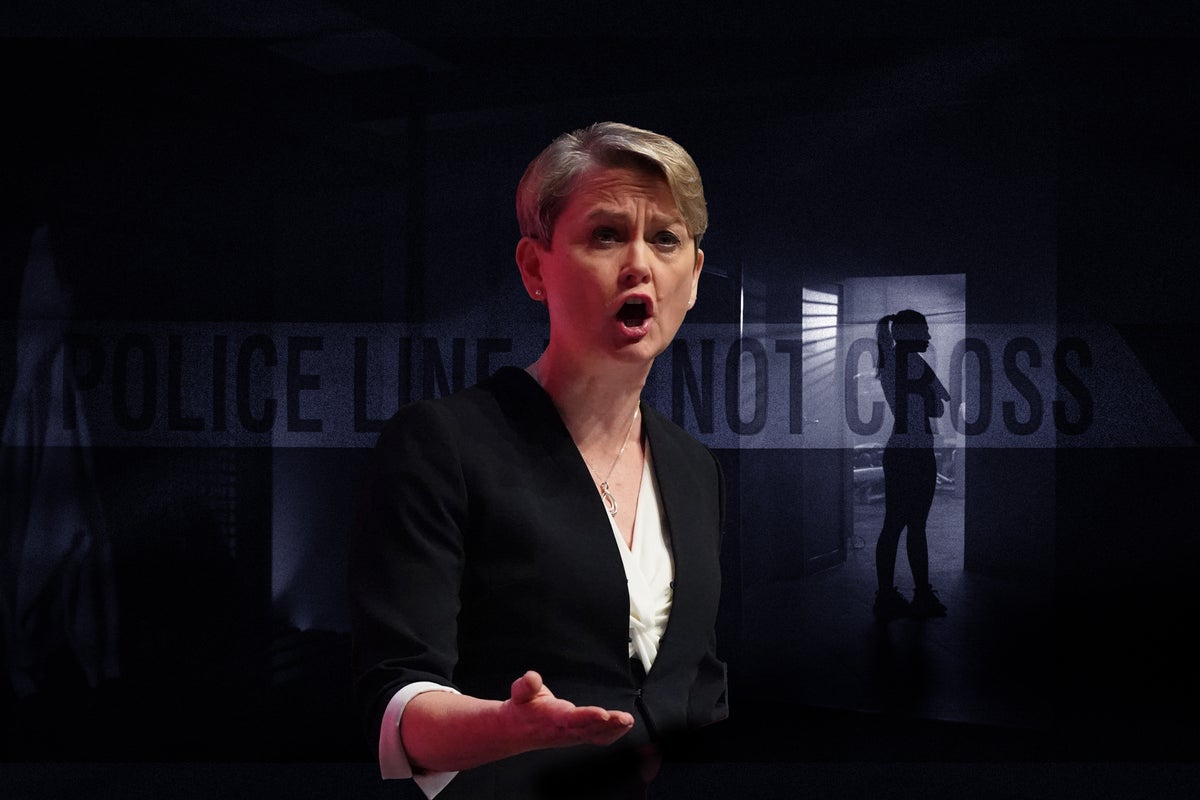
Police are missing crucial opportunities that could protect hundreds of thousands of domestic abuse victims, by failing to impose emergency restraining orders on their alleged attackers – a state of affairs that Labour has pledged to put an end to.
Shocking figures show that just over one per cent of those who complained of abuse were given a domestic violence protection order (DVPO), an emergency order that requires the alleged offender to leave the premises and not contact the victim.
Some forces handed out just 10 in a year – including Hertfordshire Police, whose failings may have contributed to the death of Kellie Sutton, who took her own life after a campaign of abuse by her partner.
Shadow home secretary Yvette Cooper has promised a clampdown on police failings, launching Labour’s plans to force change in an article in The Independent.
The party would make it mandatory for officers to consider the need for a protective order within 24 hours of an arrest or a police report.
Ms Cooper told The Independent: “No woman who has the courage to report an incident like domestic abuse or stalking to the police should wake up the next day and find that no action has been taken and nothing has changed.
“The police have tools to protect victims of [violence against women and girls] at the earliest opportunity; they simply must use them. Never again should we hear that the police could have done more. Missed opportunities cost lives, and too many have already been lost.”
According to government figures, only 10,489 DVPOs were applied for in the year ending March 2022, despite more than 1.7 million women experiencing domestic abuse and more than 800,000 police reports.
Domestic abuse charity Refuge, which has partnered with The Independent to raise awareness of such crimes, said the failure by police to act was putting lives at risk. Meanwhile, Charlotte Proudman, a barrister specialising in violence against women and girls, asked: “How many lives could have been saved if the police had secured [these orders] for victims?”
Nogah Offer, from the Centre for Women’s Justice, said the figures were “shocking”, adding that what is needed is “an effective system to keep survivors safe”.
Shadow home secretary Yvette Cooper has promised to clamp down on police failings, launching Labour’s plans to force change in an article in The Independent— (PA Wire)
Police apologised for not considering such an order in the case of Raneem Oudeh, 22, who was murdered by her ex-partner outside her mother’s home in Solihull, West Midlands, in August 2018.
West Midlands Police later said it “should have done more to safeguard Raneem”, including by considering interventions such as a domestic violence protection order, “which could have made her home a safer place”.
Meanwhile, an inquest jury concluded that failures by Hertfordshire Police may have contributed to the death of Kellie Sutton, 30, who was found unconscious at the home she shared with her partner in Welwyn Garden City in August 2017.
Officers had visited her home just weeks before she died after they were alerted by neighbours. The jury found that, had further investigation or action been taken by the police, it may have prevented her death.
Hertfordshire Police said it had since changed its processes. While it applied for just 10 orders in 2022, the force told The Independent that it had issued 109 to date this year – nearly 11 times as many. In response, Ms Cooper said: “As the Hertfordshire response to the failings in Kellie Sutton’s case shows, these powers have been chronically underused.”
Under Labour’s plans, strict new 24-hour time limits would be brought in, during which officers must assess whether or not an order would be suitable. Forces would also have to submit regular figures – and their reasons for failing to apply for orders – to the National Police Chiefs’ Council (NPCC) and the Home Office.
The police have said that tackling violence against women and girls is a priority, but that protection orders may not always be appropriate. Dr Proudman, however, insisted that they can make a difference. She said: “Civil orders have the potential to save victims and children’s lives. The police’s failure to consider the need for DVPOs shows they are not protecting survivors from domestic abuse.
“Within hours of a report of domestic abuse, the police should be seriously considering civil orders. The longer they wait, the more harm perpetrators can cause to victims. How many lives could have been saved if the police had secured DVPOs for victims?”
Ellie Butt, head of policy and public affairs at Refuge, said: “We know that domestic abuse has a higher rate of repeat victimisation than any other crime, and the inability by police to quickly put these protective orders in place – and then, importantly, enforce them – puts women’s lives at risk.”
She added: “Refuge would like to see police proactively monitor protective orders, ensuring that perpetrators are complying with the conditions. Currently, the onus is on survivors to report when these orders are breached, giving women little confidence in the system.”
She also called for police training to be improved so that officers are made aware of the legislation in place to protect survivors.
Sophie Francis-Cansfield, of leading domestic abuse charity Women’s Aid, said the organisation welcomed Labour’s pledge because it is critical that victims are kept safe.
She added: “To ensure this is a success and has a tangible impact, it is essential that existing challenges around DVPOs are addressed, namely ongoing legal aid cuts and enforcement.
“Police forces must have the right resources, training and understanding around domestic abuse for survivors to be kept safe and perpetrators to be held accountable.”
Alessia Bianco, of Hestia, another domestic violence charity, said: “Police must be fully equipped to use protective orders effectively in order to properly protect survivors of domestic abuse and stalking. This requires careful dissemination and awareness-raising among all officers.”
The government said it expects police to treat reports of domestic abuse “with the utmost gravity, without exception”. A government spokesperson said: “Earlier this year, the home secretary announced a package of measures which go further than ever before in protecting women and girls from domestic abuse.
“We have been clear that we expect the police to treat these reports with the utmost gravity, without exception. We have classified violence against women and girls as a national threat for the first time, setting clear expectations that police must treat these crimes on a par with tackling threats like terrorism, serious and organised crime, and child sexual abuse.”
A spokesperson for the NPCC said: “Tackling abuse, stalking and violence against women and girls are priorities for policing, and we are committed to protecting victims and bringing perpetrators to justice.”
They added that while DVPOs are an important tool, “they are a civil rather than a criminal order, and may not be appropriate where alternatives such as a criminal justice outcome are being sought.”
A spokesperson for Hertfordshire Police said that the force takes tackling domestic abuse “very seriously”. He added that its approach had been informed by the findings of the inquest into Ms Sutton’s death.
He said: “Every case dealt with by the unit is now assessed by specialist officers for [its] suitability for a domestic violence prevention order. We have also built close working relationships with the courts to help ensure the successful granting of applications, and training about the orders has been delivered to teams across the force.”
The national domestic abuse helpline offers support for women on 0808 2000 247, or you can visit the Refuge website. There is a dedicated men’s advice line on 0808 8010 327. Those in the US can call the domestic violence hotline on 1-800-799-SAFE (7233). Other international helplines can be found via www.befrienders.org







